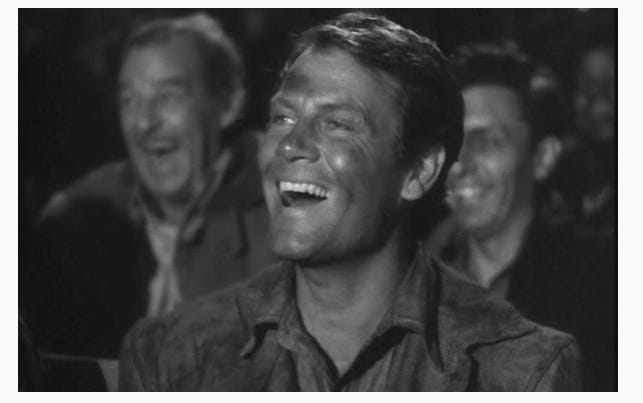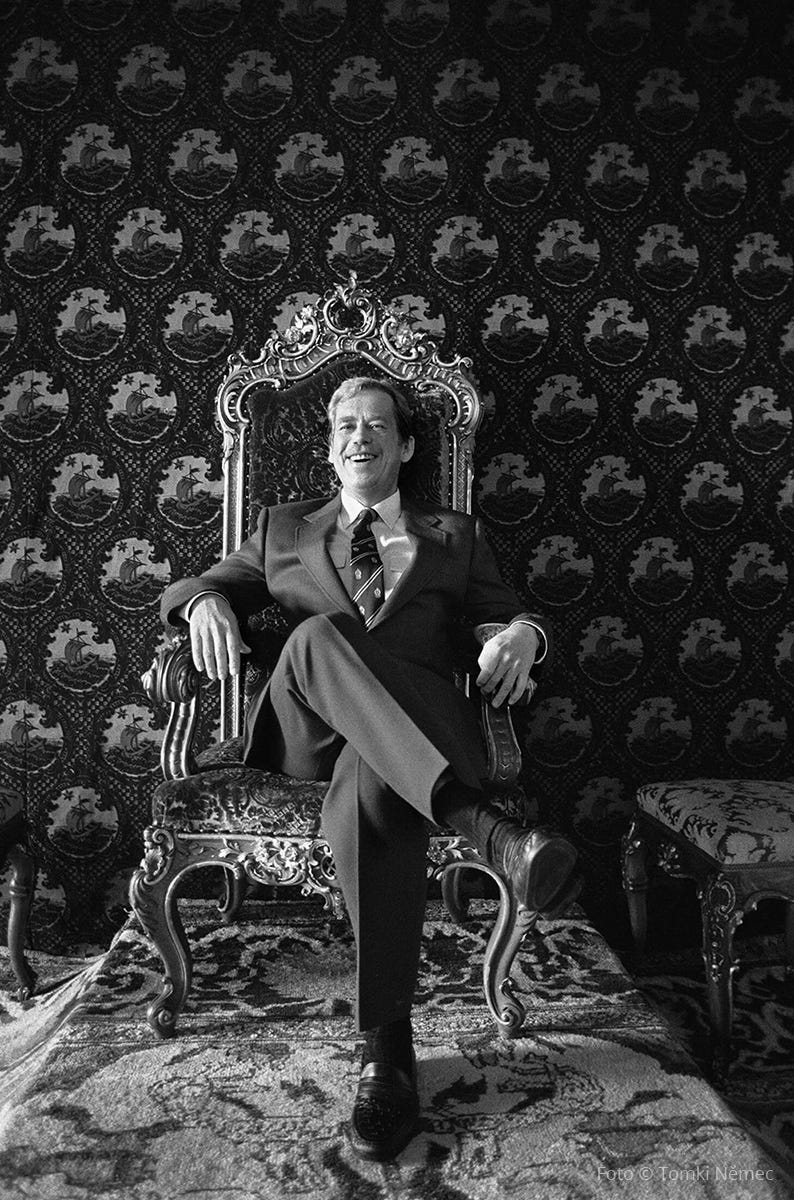A brief warning: The Chris Rock, Ted Lasso, and Sarah Millican videos linked below include cursing and some NSFW material, so if this is not your thing, or if there are kids around, forewarned is forearmed!
In Preston Sturges’s 1941 film Sullivan’s Travels, the director John Sullivan decides that the silly comedies he usually makes are trivial and not worthy of his talents. He decides to create, for his magnum opus, a highbrow art film called O Brother, Where Art Thou?1 He intends his film to bear witness to the suffering of ordinary Americans during the Great Depression. So, for research, he goes undercover as a homeless man, embarks on a number of escapades (with the help of a fetching Veronica Lake) and discovers that ordinary people don’t want lugubrious art films documenting their suffering.2 They want comedies to distract them and make them laugh for a couple of blissful hours.

Sullivan thought that making a serious, dramatic film would be the highest challenge, but he was wrong. As the saying goes, dying is easy; comedy is hard. But it’s worth the effort. Take Donald O’Connor’s acrobatic performance of “Make ’Em Laugh” in Singin’ in the Rain. The film celebrates the power of comedy to brighten our lives. Filming this scene put O’Connor in the hospital for exhaustion (it didn’t help that he was a heavy smoker), but generations of viewers, who laugh in awe at his virtuosity, appreciate his sacrifice.
Comedy not only makes tough times tolerable, but it also has the power to unite us. When we’re laughing together, it’s more difficult to hate each other. The following joke, for example, has been scientifically proven to be funny to the most people across cultures and around the world:
Two hunters are out in the woods when one of them collapses. He doesn’t seem to be breathing and his eyes are glazed. The other guy whips out his phone and calls the emergency services. He gasps, “My friend is dead! What can I do?” The operator says “Calm down. I can help. First, let’s make sure he’s dead.” There is a silence, then a shot is heard. Back on the phone, the guy says “OK, now what?”
In fact, comedy does more than distract us from our troubles and bring us together; it makes us better people and can even help defeat tyranny. Don’t believe me? Read on!
Comedy Tells Us the Truth
Comedy makes us better people, because comedians are able to communicate uncomfortable truths about us and our culture. Lecturing is easy; comedy is hard. But it’s worth the effort. If someone were to recite a list of our flaws at us, we would likely throw ourselves into a defensive crouch, refuse to listen, and even fight back. But when we’re laughing, we’re forced to admit, “Yeah, you’re right. You got me there.” Think of Jerry Seinfeld, revealing the many amusing ways we humans can be selfish or petty. Or George Carlin, exposing how we use euphemisms to shield ourselves from unpleasantness. My favorite comedian is Chris Rock, who combines extraordinary candor about himself (in “Tamborine,” for example, he talks about how his porn addiction destroyed his marriage) with trenchant observations about us and our country—like this famous observation:

Below is a particularly searing observation Rock makes about our culture’s worship of celebrities and our willingness to excuse the evil acts of famous people: “That’s how much we love Michael. We love Michael so much, we let the first kid slide.”
Jokes encourage us to improve ourselves, if only to avoid being like those benighted folks in the punchlines. Speaking of which, here’s a joke I love. Perhaps the peasant reminds us of certain people we could name, or perhaps even us too, in our more envious and spiteful moments:
A peasant is plowing his field when he comes across an old bottle. Thinking it might be valuable, he polishes it, and out pops a genie!
“Thank you for freeing me!” says the genie. “As your reward, I will grant you one wish.”
The peasant thinks for a moment, then says, “Well, my neighbor has three cows, and I only have two. Genie, I want you to KILL two of my neighbor’s cows!”
Comedy Is Radical
Before he became the first democratically-elected president of Czechoslovakia after the fall of Communism, Václav Havel wrote absurdist comedies that criticized the Communist system. When the authorities banned him from working in the theater, he circulated his works through samizdat. These works helped shore up the spirits of the Czech resistance and kept criticism of the regime alive. For these “crimes,” the authorities interrogated and imprisoned Havel several times. The Czech photographer Tomki Němec took the photo below in 1990. We can imagine Havel thinking back on his life—in all its absurd ups and downs and twists and turns—and laughing with gusto.
This next photo documents a visit Havel made to the cell in which he spent his longest period in prison—almost four years. This time his smile is more poignant but testifies to the strength Havel’s sense of humor gave him to survive and prevail.

Dominating others is easy; comedy is hard. But it’s worth the effort. Czechs’ sense of humor sustained them during Communist times and ultimately helped them to overthrow their tormentors in the Velvet Revolution. One of my favorite examples is the story of the Lennon Wall. In the Malá Strana neighborhood, near the Charles Bridge, there was once a long, plain white wall. The night John Lennon was assassinated, students sneaked out to cover the wall with graffiti honoring Lennon (i.e., not Lenin), freedom, and peace. The Communist authorities were outraged and immediately whitewashed the wall. Undaunted, the students painted it again, the authorities whitewashed it, the students painted it . . . and the cycle continued until the authorities gave up and let the wall remain as a joyful monument to creativity and playful rebellion.
My husband lived in Leningrad and Moscow before the fall of the Soviet Union and brought back a treasure trove of Russian anecdotes. Anecdotes are cynical jokes that allowed Russians to express forbidden feelings of dissatisfaction with the government. Jokes like these help to defeat pluralistic ignorance—the false and destructive belief that we are the only ones who feel a certain way about an issue or situation. Anyway, here are a few of my favorites:
A judge is chuckling to himself, when another judge comes up and asks, “What’s so funny?” “Oh, I just heard a great joke!” he replies. “Wonderful! I love jokes! Tell it!” “Are you kidding?! I just gave a guy ten years in the gulag for that joke!”
Another version of this joke is that the Soviets are holding a joke contest. Second prize is five years in the gulag. First prize is ten years in the gulag.3
It’s 1946, and a man looks around him at all the misery in Moscow and, shaking his head, says sadly, “This is all the fault of that bastard with the mustache!” Unfortunately for him, some KGB agents overhear him and bring him straight to Stalin himself. “Explain yourself!” Stalin demands. “Comrade leader! I was talking about Hitler!” the man protests. “Very well, you may go,” says Stalin, and then turns to the KGB agents. “Who did YOU think he meant?”
A man waits in a long line to buy bread, and when he gets to the head of the line the clerk tells him they just sold out. Angrily, the man grumbles, “Always with the shortages! When are they ever going to fix things?!” Unfortunately for him, a retired KGB agent overhears him. The KGB agent says, “In my day we would have had you shot for saying such things!”
The man goes home, and his wife, seeing that he is empty-handed, sighs and says, “I see they have run out of bread again.” “It’s worse,” replies the man. “They’ve run out of bullets.”
Stalin is giving a lecture when someone sneezes. Stalin stops and peers at the audience. “Who sneezed!?” he demands. He is met with total, terrified silence. “If no one admits to it, I am going to have my guards shoot the entire first row.” Still no one speaks up. “Very well. Guards!” and the guards shoot everyone in the first row. Again Stalin asks who sneezed, and again no one speaks up. This time Stalin has his guards shoot everyone in the second row. A third time Stalin asks who sneezed, and this time a tiny voice from the back pipes up. “It was I, comrade leader. I was the one who sneezed.” “Gesundheit,” says Stalin, and resumes his lecture.
These days we thankfully don’t suffer the terror and misery of life in Communist Czechoslovakia or the USSR. But humor has a role to play in current political disputes too. Too often, when someone says something we don’t like, we respond by shutting them down, sometimes aggressively. Cancelling is easy; comedy is hard. But it’s worth the effort. A few years ago, in a small Bavarian town, neo-Nazis held a march. The townspeople turned out in droves to mock the marchers. They made the march an “involuntary walkathon”4 for an organization that helps people leave right-wing hate groups. For every meter the neo-Nazis marched, the organization got more money. On the sidelines the townspeople held a festival complete with costumes, confetti, and goofy signs. As a commenter notes, “Humor is a particularly powerful tool—to avoid escalation, to highlight the absurdity of absurd positions and to deflate the puffery that, to the weak-minded at any rate, might resemble heroic purpose.” (You can find these quotes and more about the townspeople here.)
Comedy Is Power
As I was searching for hotels for our thwarted trip to Italy, I ran across a one-star review on Trip Advisor that made me chuckle. (There is a whole genre of amusingly grumpy Trip Advisor reviews out there—for example here, where disgruntled guests complain that a beach is “too sandy” and the Great Wall of China is “just a wall.”) So this guy crashed his car into a pillar in a parking garage down the street from the hotel, and when the hotel wouldn’t pay to repair the damage, he blamed the hotel for its “lack of accountability.” Dude! Who was driving the car, you or the hotel? Do you know how ridiculous you look?
Speaking of looking ridiculous, here’s a personal story. Last fall, my husband and I took a bike tour of the Chianti region. At one point we stopped to look at some grape vines, and our guide warned that there was a deep ditch between the road and the vines. I charged ahead, ignoring his outstretched hand, and—of course—slipped and fell flat on my face in front of everyone. (This kind of thing happens to me all the time; you’d think I’d learn.) Now, I could have gotten angry and written a scathing Trip Advisor review about how the tour company was exposing guests to risks or some such nonsense. Instead, I leaped to my feet, called out triumphantly, “TA DA!” and then said that I had fallen on purpose as a demonstration for the other guests. (Everyone laughed—and then availed themselves of our guide’s help. No one else fell.)
A couple of weeks ago, Ted Lasso showed how self-control and a sense of humor about ourselves is a boss move. When a reporter asks Ted about a cruel thing his former protege Nate has said about him, an awkward hush falls over the room. And then Ted turns things around by laughing at himself. By the end of the scene, the entire room is on Ted’s team.
The Ted Lasso scene updates a famous scene from Cyrano de Bergerac, in which a drunken boor calls Cyrano “big nose,” and Cyrano scolds him for his mundane insult—“what a waste of an opportunity”—and proceeds to mock himself in much more imaginative terms, to everyone’s delight. Please enjoy Steve Martin’s wonderful version of the scene, from Roxanne:
When we are hurt, insulted, embarrassed, or ashamed, it’s a natural reaction to get angry, to retaliate, to escalate, to lash out. Anger is easy; comedy is hard. But it’s worth the effort. It is psychologically healthy for us to stop, think, and try to laugh at ourselves. I reject the maxim that it is better to be feared than to be loved; we have more power when people like us, and we’re happier and more effective when we laugh together.
How about you, readers? Who are your favorite comedians? How has a sense of humor helped you through life’s challenges? What’s your favorite joke? Please share your thoughts (and jokes!) in the comments!
The Tidbit
Christopher Hitchens was brilliant and eloquent, but he could be wrong on occasion. To wit, about Iraq, and also in his opinion that women aren’t funny. According to Hitch, women aren’t funny because we don’t need to be in order to attract men (and what other purpose in life could we possibly have?). Did Hitch just not notice that there are women out there who aren’t supermodels and who thus need to rely on more than our looks to get attention? Was he so humorless as to be immune to the talents of women from Jane Austen to Joan Rivers and everyone in between? I’m not sure.5 Anyway, one of my other favorite comedians is Sarah Millican, who, in spite of being handicapped by her two X chromosomes, is very, very funny. Enjoy!
This is the source of the title of the Coen Brothers’ film.
A brief digression: Publishers and pundits lament that so few Americans read literary fiction. I’m just spitballing here, but if writers want a wider audience, they could take a page from Sullivan’s book and try some lighter fare once in a while. Highbrow books do tend to err on the grim side. Here, for example, are quotes from the four capsule reviews in a recent issue of the New Yorker:
abuse and murder in orphanages. … shared so many horrifying traits that their violence can only be termed institutionalized.
a childhood marked by the ordeal of his father … who, as a boy in Hungary, managed to jump off a train that was headed to Bergen-Belsen.
Black women from Texas reckon with their complex relationships to their bodies, which are by turns deprived of sex, rendered husk-like after childbirth, and physically battered.
In her mid-thirties, she flees a dead-end job and a failing marriage, embarking on a journey that leads to a confrontation with childhood trauma.
Yeesh. No wonder readers shy away from such books!
I love that there is an American version of this joke, about the contest where first prize is a week in Philadelphia, and second prize is two weeks in Philadelphia. See? Comedy unites us!
I am proud that alumni from my alma mater, the University of Chicago, organized a similar protest a few years ago when a business school professor planned to invite Steve Bannon to speak on campus. Instead of trying to shut down or shout down the event, alumni (including me) turned the event into an “involuntary talkathon,” by pledging money to a group called South Side Not Steve. The idea was that for every minute Bannon spoke, we would donate money to organizations that helped Black people in the neighborhood. The longer Bannon would talk, the better off the Black neighbors would be. Take that, Herr Bannon!
Interestingly, after South Side Not Steve became public, the professor decided not to invite Bannon after all. I suspect that he had only proposed inviting Bannon in the first place in the hopes of provoking a brouhaha, against which he could inveigh, and when we responded to his trolling in a true Chicago pro-free-speech fashion, it took the wind right out of his sails.
I once heard a joke by a comedian—I wish I could remember his name to give him credit—who offers another explanation for why a certain type of man doesn’t think women are funny:
Several couples are at dinner together, and one of the wives starts to tell a joke: “So Jesus, Moses, and Hitler walk into a bar—” and her husband interrupts her, saying, “Now honey. You know that could never happen. They didn’t even live in the same century! Would you listen to her? ‘Jesus, Moses, and Hitler!’ The very idea!”






I laughed through this post...esp. the Stalin joke.
"They've run out of bullets" might be the most Russian punchline I've ever heard lol. Great post